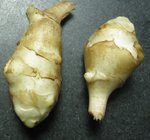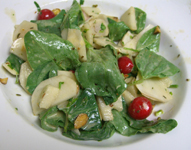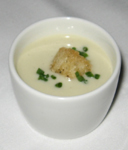Selection and storage
 |
| Cleaned sunchokes. Photo courtesy: mlinksva |
Sunchokes are commonly found in the US markets year-round. Fresh farm harvest hit the markets from October and may last until the winter and spring seasons. In the stores, buy tubers with a smooth surface as they pose less difficulty in the preparation. Look for average-sized, clean, firm tubers. Avoid any sprouted, diseased, or bruised roots.
Once at home, store them in the refrigerator set at 33 to 35 degrees F, and at very high relative humidity.
Preparation and serving methods
Wash the tubers thoroughly in cold water with a gentle scrub. Although peel is fine to eat, it is discarded using a vegetable-peeler. The
root artichokes are high in iron content, and cut ends turn brown soon upon exposure to air, as in apples. To prevent this, drop cut pieces into a bowl of cold acidulated (lemon) water.
Jerusalem artichokes are one of the very versatile vegetables. The tubers can be employed in a variety of ways in cooking. They can be eaten raw like parsnips in salads or boiled and mashed, roasted, or sauteed like a potato. Do not overcook, as they turn soft and mushy rather quickly.
Here are some serving tips:
 |
 |
| Fava greens with radishes, almonds, and sunchokes. Photo courtesy: benketaro |
Cold sunchoke soup. Photo courtesy: Arnold Gatilao |
-
Fine julienned tuber can be a great addition to salads or slaws.
-
Deep-fry its thin slices in vegetable oil (as in potato chips) to prepare chips.
-
Boiled sunchoke can be pureed, and can be used as a dip or in fillings for pancakes.
-
It complements well with other tubers like a potato in a variety of mouth-watering stews and soups. Roasted sunchoke is eaten as a side dish with turkey, lamb, etc.
Safety profile
Jerusalem artichoke contains inert carbohydrates in the form of inulin. Inulin does not get digested in the gut and passes as it is in the bowel movements. Sometimes, this may cause troublesome indigestion problems, especially in those who are new to use them in the food. Eating a large quantity of roughage may cause gaseous distension and gripping pain in the stomach. (Medical disclaimer).
≻≻-Back to Vegetables from Jerusalem artichoke. Visit here for an impressive list of vegetables with complete illustrations of their nutrition facts and
health benefits.
≻≻-Back to Home page.
Further resources:

